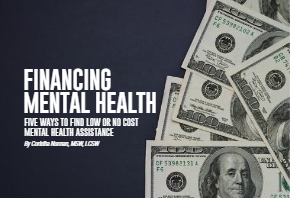
Financing Mental Health: Five ways to find low or no cost mental health assistance
We know. We know that we need to reach out. We know we need help. We know that we need to talk to someone. Things are getting worse and it is becoming harder to hide that something is going on with us. Then there is the emotional eating, not keeping up with our responsibilities, crying and snapping on people that don’t deserve it. We know that, but don’t know how. We don’t know how we can afford the mental health help that we so desperately need. Of course insurance can make it easier if you only pay a low copay for services. However, insurance deductibles and overall plan cost can be deterrents, amongst other things for other individuals.
Build a Support System
It takes a village they say. Some of us weren’t born into such loving and supportive environments. Some may find themselves being moved to a new city where they don’t have prior connections. No matter your age or circumstance, do what you can to begin building a support system. There are many circumstances that can predispose someone to larger mental health concerns that can be combated with support. Whether it is someone to talk to that you trust, someone to help you make a major decision, or someone to give you a break away from parenting for a day; knowing that you have someone to rely on can assist in the prevention of some mental illnesses.
EAP
There are many employed individuals that are unaware of having this particular benefit as an employee. Many employers offer Employee Assistance Programs, or EAP. These programs afford individuals an opportunity to have a limited amount of therapy sessions for free. At the end of the allotted the employee is assisted with referrals to long term therapeutic services or resources to assist with their issue. Once again this is a free service, as your employer pays for the EAP sessions. Find out if your employer offers an EAP program. You may be surprised to learn that your employer does.
Religious Based Centers
There are some churches, temples and other religious organizations that offer reduced fee mental health services to their members. Sometimes this benefit extends to the greater community depending on the size of the organization. Due to the nature of organizations, the services rendered will likely be delivered from a perspective of the provider’s religious belief system. As long as that is alright with you, you could end up saving you a great deal of money per session. Take some time to ask around or search your community for resources of this type on the internet.
Sliding scale/income based services
Income based service fees are not a thing of the past. There are still numerous service providers that offer income based or sliding scale fees. What’s the difference? It depends on how the service provider decides to implement the idea. Some providers choose to offer one flat rate fee to individuals that make under a certain income. Other providers will reduce the cost of services based upon the credentials of the therapist or counselor offering the services. There is also the option of an income based sliding scale. In this case, the service fee is reduced based upon the prospective client’s income range. A certain fee is assigned to each income range that the provider chooses to offer. Bonhomie, L.L.C. offers the latter of the three examples. If you are in need of reduced service fees, don’t be afraid to ask if a provide offers income based fees. If you’re nervous of asking, look for this information on their website.
Self-regulation
This almost sounds too easy. There are so many circumstances we find ourselves in that could be prevented. Some of our everyday choices result in a decline in our mental health. Examples are unwanted pregnancy, staying in unfulfilling or abusive relationships/friendships, or even choosing to use self-sabotaging coping skills. We can improve our own mental health by making healthy choices, reducing impulsivity, and sticking to our own values. All too often we end up sacrificing ourselves into mental illness instead of choosing ourselves into mental health.
No Comments
Leave a reply
You must be logged in to post a comment.






